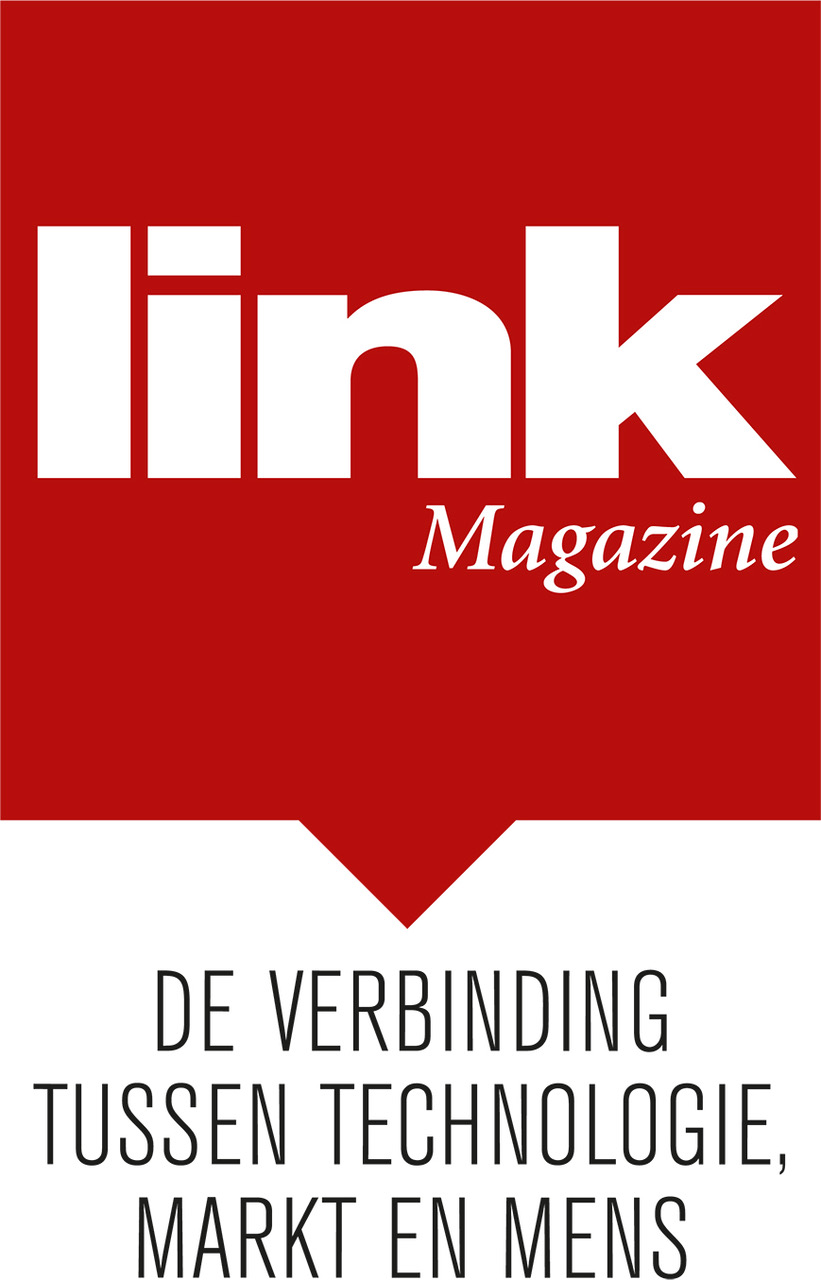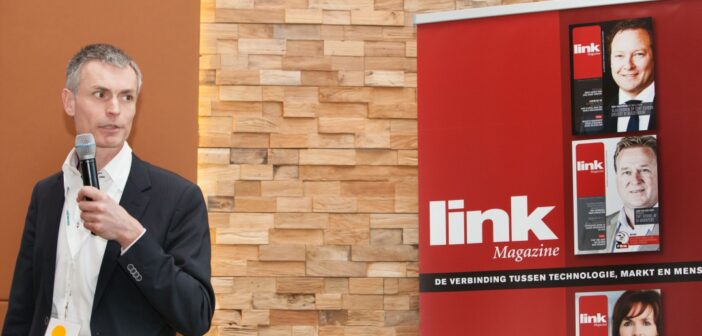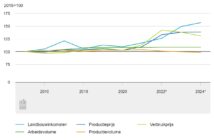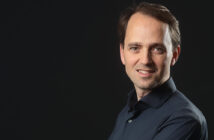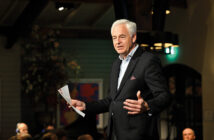Theme: Innovative business models for Dutch high-tech
Are you ready to open the doors even further?
The ‘factory of the future’ doesn’t just set high technological expectations – such a smart environment pre-eminently offers possibilities for new business models as well.Think of smart communities where the partners themselves develop, engineer, produce and even commercialise together.Around 50 people from the manufacturing industry came to the second Link Café powered by Siemens Industry Software at the end of March.Led by Eindhoven’s Professor of Technology Marketing Ed Nijssen, they tackled a few urgent questions about the factory of the future.The doors need to be open, but how far?
The Link Café was held in Classic Park, Boxtel. According to their site, the car paradise has the ‘most beautiful collection of classic and exclusive cars in the Netherlands’. The 1929 Rosengart Spider, the 1957 Jaguar XK 150 and the 1966 Bond Equipe GT4S – three cars picked at random – glisten behind the glass that separates the restaurant from the car museum. Classic Park also has a lot of cars for sale: for €350,000 you could own a 1949 Alfa Romeo 6C 2500 Sport Pinin Farina. A 2005 Spyker C8 Spyder will set you back €185,000. The common factor for all the classic cars in the museum is they don’t have a CPU. Imagine if the cars today were the same.
Infinitely complex
‘A half decent car nowadays has hundreds of CPUs in it. And this quickly leads to 100 million lines of software code’, explains speaker Bas Kuper, Siemens Industry Software Benelux’s Vice President and Managing Director, to the Link Café’s participants. Producers and suppliers are dealing with an endless complexity: ‘We are investing enormously in process automation and still, average productivity is declining worldwide. Products are continuously becoming more complex due to mass customisation, desired quality, all the regulations, sustainability requirements, you name it. It is becoming more difficult to achieve good margins.’ The number of analyses to which products and processes are subjected is never ending. This leads to a mountain of data. How do you manage that complexity? ‘Is Big Data the solution?’ Kuper asks the audience.
 A factory is a printer
A factory is a printer
He continues: ‘The factory of the future is a printer’. The American company Local Motors claims that they can print three quarters of a car within eight hours. This brings the costs of scale towards 0. SpaceX in California is setting its sights on commercial space travel and wants to make spacecraft for a tenth of the price. Kuper: ‘So you have to do something radically different. No single market position is sacred anymore; a large number of business icons have already taken a tumble. Quick adapters are going to win.’ And this leads him to his theory for the entrepreneurs present: ‘Companies who use, reuse, analyse and manage big data have competitive advantages: big data is the success factor in becoming more competitive and developing new business models.’
Data mess
This gives the participants a starting point for discussion. The whole big data story creates more, as well as different and unexpected, data. That much is clear. But what does this  mess produce? How do you sensibly filter it and end up with usable, smart data? ‘We can put loads into a computer. A computer can literally make everything in a simulated environment. But do you end up with the products that you actually want?’, asks Edward Voncken, CEO of KMWE and Managing Director of Brainport Industries Campus (more on this later). Clients and suppliers demand an abundance of simulations and want ultimate control over what is delivered to them. Thanks to data analyses and minimal deviations, they are asking questions which they didn’t even think about in the past.
mess produce? How do you sensibly filter it and end up with usable, smart data? ‘We can put loads into a computer. A computer can literally make everything in a simulated environment. But do you end up with the products that you actually want?’, asks Edward Voncken, CEO of KMWE and Managing Director of Brainport Industries Campus (more on this later). Clients and suppliers demand an abundance of simulations and want ultimate control over what is delivered to them. Thanks to data analyses and minimal deviations, they are asking questions which they didn’t even think about in the past.
In the meantime, what do you do with all your employees’ expertise and experience? Can you extract the information from their heads and put it into your computer models? People are still cleverer than robots. Are we not overreacting about big data and the Internet of Things? ‘Ah’, someone says in the Link Café, ‘we’ll probably see an overshoot.’ It is trendy nowadays to think that the system knows better than us. But this will correct itself. Let us continue thinking for ourselves. The importance of data should not be underestimated, but whoever keeps just milking data will not get very far. For innovation we need new input and creativity. Big data helps us to master processes, but it is nonsense to assume just a mass of data is the solution to everything.
Smart campus
Let’s return to Edward Voncken, who has his own story to share with the Link Café participants, with a question to consider. Voncken is busy setting up the Brainport Industries Campus with a number of parties in Eindhoven. It is going to be a modularly built, physical environment that is focused on cooperative development and education. OEMs, launching customers, engineers, suppliers and educators will meet each other on campus. If desired, they have their own spaces and can work on open innovation in the Atrium. They will share facilities and create roadmaps together. KMWE will move into the first building by the end of 2017 and every few years a new part of the campus will be completed. ‘The Brainport Industries Campus is a unique collaboration’, emphasises Voncken. He sums it up: ‘Leading, 24/7 production, the most innovative technology, the smartest way of cooperation, new earnings models, the best educated people. Thanks to this futuristic campus, we will be able to keep responding flexibly to market changes. What does Voncken want to know from the people in the room?: ‘What impact would this way of working have on your own business model? Do you also want to make your business part of a stable, physical ecosystem?’
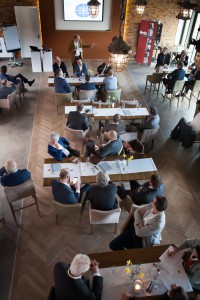 Sharing is okay, but how much do you share?
Sharing is okay, but how much do you share?
‘I see opportunities’, says Rens Wagter, General Sales Manager at EBV Elektronik (Maarssen), supplier of electronic parts. ‘I like to share my predictions about the field of technology with my clients. I would like to regularly meet others in the Atrium in order to share our knowledge. It is good to work with relevant partners who are within reach.’
‘But it is also difficult’, echoes the room. Stronger networks in the region are definitely needed and such a campus provides opportunities. Sharing research and educational facilities can be very fruitful. But how far do you go? Open innovation calls for other ways of thinking and a lot of mutual trust; it requires very good agreements about what you do and do not want share. Companies like to protect their deals and are very internally focused – they won’t just connect their IT systems at the snap of a finger. This makes working together difficult but how do we change that? Connect Group Netherlands’ Business Manager Niel van Son: ‘We call ourselves high-tech, but everybody does it their own way; processes are set up differently everywhere. More open innovation forces us to look at the hurdles that we will all encounter.’
Beware of inbreeding
The willingness to open doors further is there; the response in the room is overall a positive one. We have to thoroughly search for the greatest common denominator that fulfils the needs and desires of all the parties on the campus. The people of Brabant are good at forging and maintaining relationships as we have seen in the past. However, in Eindhoven, they have to be careful of ‘inbreeding’, because too having too much fun and banter doesn’t help us progress.
Discussion leader Ed Nijssen, from Eindhoven University of Technology, is pleased to hear the discussion: ‘In our society where everything seems to be moving online, we think “No, we’ll huddle together. Innovation asks for intensive cooperation close to home.”’ He advises the audience that those who are considering a new-build should have a good think as to whether they want their new-build to be part of a campus or not.
Open source
Jan Benders, Lecturer at HAN University of Applied Sciences, raises a third and final question. He is the leader of the Fast and Curious project in Gelderland. This is an initiative of Benders, a couple of HAN students and the HAN Vehicle Mechatronics Readership. It is another wonderful example of yet more collaboration between business and education. Within the project, the team has produced a software toolbox that makes the development of operating systems cheaper, quicker and less sensitive to mistakes. ‘For us it is about Model Based Development. More and more businesses from the automotive industry, but also from the robotics and agro technology industries, are latching on to our community. We do not yet have a sustainable business model, but a useful network has arisen for exchanging tools and knowledge’, explains Benders. He treats the Link Café’s participants to one more challenging theory: ‘Open innovation requires open source.’
Not too open and exposed
‘Not necessarily’, is the response in the room. ‘Open source means that everyone can freely use everything you have invented. I have come across a lot of open-source initiatives, but only few of them are successful’, states Piet Tak, B&R Industriële Automatisering’s Director. ‘Look at UNIX, the road to acceptance in the professional
world was long.’ It is better to find acceptance in a good communication protocol. ‘Open innovation requires honesty. But that is not same as open source’, says Ralph Habets, Director of Mellink, manufacturer of industrial packaging in Schijndel. ‘Cooperation is about giving and taking, not laying all your cards on the table.’
Because if you lay all your cards on the table and everybody uses each other’s cards, how do you validate your processes and warrant your product liability? What is the quality of the cards? Take Wikipedia for example: biased information or even nonsense can appear there.
John Blankendaal, Brainport Industries’ Managing Director, questions whether open innovation is possible. He prefers to talk about collaborative innovation in order to put something more quickly onto the market together. ‘Open innovation makes me think of throwing everything out into the open. “Here you go, enjoy it.” That doesn’t work. Sharing knowledge is fun, but not with everyone.’
Second Link Café powered by Siemens Industry Software
The discussion in Boxtel about new business models for the factory of the future was the second edition of the Link Café powered by Siemens Industry Software. The meeting was based on the ’World Café’: an informal setting where people take part in group discussions and change between groups. Eindhoven’s Professor of Technology Marketing Ed Nijssen was the discussion leader. Three theories were proposed:
- Big data is the success factor in becoming more competitive and developing new business models.
- Make your business part of a close-knit, physical ecosystem.
- Open innovation requires open source.
Link South Netherland special 2016
